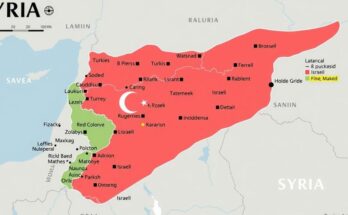Mayotte is currently battling the effects of Tropical Storm Dikeledi, just weeks after Cyclone Chido caused widespread devastation. Authorities have issued a red alert as heavy rain and winds threaten the islands, advising residents to seek shelter. Dikeledi follows Cyclone Chido, which left dozens dead and many more injured. The ongoing cyclonic activity underscores the region’s susceptibility to natural disasters and the urgent need for preparedness measures.
Mayotte, a French territory located in the Indian Ocean, is presently enduring the impacts of Tropical Storm Dikeledi, which has struck the islands shortly after Cyclone Chido created significant devastation. Dikeledi has caused heavy rainfall and fierce winds, prompting the issuance of a red alert by local authorities. Citizens have been advised to take shelter and prepare essential supplies to safeguard their wellbeing amidst the threat of flooding and landslides.
Cyclone Chido, which impacted Mayotte on December 14, resulted in at least 39 casualties, leaving over 200 individuals missing and more than 5,000 others injured. As Dikeledi approached, it had already inflicted three fatalities in Madagascar before it diminished in intensity. However, authorities remain vigilant as there is potential for Dikeledi to regain strength and transform back into a cyclone.
Mayotte, already grappling with the repercussions of Cyclone Chido, has had its international airport closed due to damage sustained during the previous cyclone. Residents have been urged to seek refuge in cyclone shelters, especially those in the southern village of Mbouini, which was severely flooded by Dikeledi after having previously been spared by Chido.
This territory, with its population of around 320,000, also accommodates a significant number of undocumented migrants, estimated at around 100,000. The vulnerability of Mayotte is further exacerbated by the aftermath of Cyclone Chido, which left many residents without adequate shelter and essential infrastructure.
In response to the impending threat of Dikeledi, French authorities have mobilized emergency personnel and security forces to assist the region. Mayotte is particularly susceptible to cyclonic weather, especially during the November to April season, having endured a series of severe storms in recent years, such as Cyclone Idai in 2019, which wreaked havoc across nearby nations including Madagascar, Mozambique, Malawi, and Zimbabwe.
The Indian Ocean region, especially Mayotte, is frequently affected by cyclonic weather patterns that pose severe risks to local populations. Cyclones can lead to disastrous consequences, including loss of life, large-scale destruction of property, and long-term socioeconomic disruptions. Cyclone Chido’s recent impact on Mayotte emphasizes the ongoing challenges faced by the territory as it grapples with recovery efforts. The vulnerability of both documented and undocumented populations in the region necessitates a robust response to ensure community safety and preparedness in the face of recurrent natural disasters.
The recent strike of Tropical Storm Dikeledi has compounded the difficulties faced by Mayotte following Cyclone Chido’s devastation just weeks prior. The local populace has been urged to take necessary precautions for their safety, while authorities remain on high alert for possible cyclone re-strengthening. This serves as a poignant reminder of the critical need for disaster preparedness and rapid response mechanisms in safeguarding vulnerable communities in the face of increasing natural disasters.
Original Source: www.inkl.com




